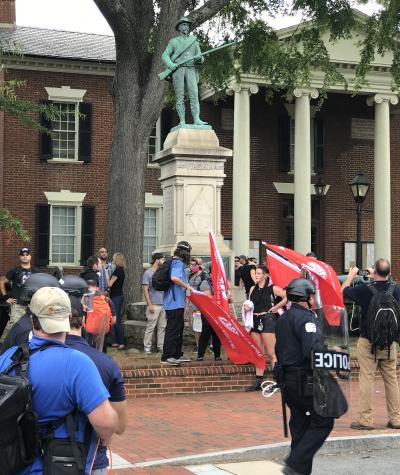Last weekend in Charlottesville, white supremacists, KKK members, neo-Nazis and other hate groups gathered in startling numbers and wreaked havoc and violence, leading to a state of emergency and the death of three citizens. The events in Charlottesville were a reminder that while we don’t see KKK rallies in the same numbers we did during the Jim Crow era, racism is still a deeply rooted problem in American culture. If we do not face it, racism will continue to poison our society.
Throughout modern American history, one of the most effective mechanisms used by white supremacists to oppress minority citizens has been voter suppression. By placing barriers between black voters and the ballot box, states and localities throughout the Jim Crow South maintained a white-dominated political order. Indeed, many of the post-Civil War constitutions, such as Alabama’s 1901 Constitution, put in place grandfather clauses, poll taxes, felony disenfranchisement laws, literacy tests, and other laws for the express purpose of maintaining white supremacy.
After years of protest, this system was only finally dislodged when Congress took the bold step of passing the Voting Rights Act (VRA) of 1965. The VRA not only removed the most common barriers to voting such as literacy tests and other devices, it put in place a system of preclearance to ensure that states could not invent new methods of suppressing the vote. Prior to the passage of the VRA, every time the Department of Justice (DOJ) managed to successfully challenge one barrier, the states would erect another. As a result of the VRA’s powerful design, minority political participation and representation increased markedly.[1] Indeed, the VRA is arguably the single most important piece of civil rights legislation Congress has ever passed because it protects the fundamental right to vote, since it is a right that is “preservative of all other rights.” In 2006, the VRA was unanimously reauthorized the VRA for the fourth time.
But 2016 was the first presidential election in over fifty years without the full protections of the Voting Rights Act. In 2013, the Supreme Court gutted the VRA’s preclearance mechanism, holding that it was based on outdated data. The Supreme Court, however, noted that Congress was free to redesign the preclearance mechanism to meet current needs.
In her dissent in Shelby County, AL v. Holder (2013), Justice Ginsburg said that throwing out preclearance that prevented discrimination in voting practices was “like throwing away your umbrella in a rainstorm because you are not getting wet.” If ever there was a sign that we are still in the rainstorm, last weekend in Charlottesville is it. The threat of discrimination is real and present and must be confronted. In 2016 and 2017, federal courts in both Texas and North Carolina have held that the Legislatures in those states purposefully erected barriers to the right to vote in order to harm minority voters’ access to the polls.
In the past few days, Representatives and Senators in Congress—including the leaders of both the House and Senate — have come forward with important and powerful statements condemning the acts and messages of hate of the rally in Charlottesville. But actions have always spoken louder than words. If Members of Congress want to demonstrate their commitment to equality in the face of hate, they must restore the full protections of the Voting Rights Act. We will only conquer the scourge of hatred and racism when all of our citizens have equal opportunities in this country and that begins at the ballot box.
[1] See Joint Center for Political & Economic Studies, 50 Years of the Voting Rights Act: The State of Race in Politics 4 (2015), https://goo.gl/05asG5 (“Since 1965, ... African Americans went from holding fewer than 1,000 offices nationwide to over 10,000.”).

